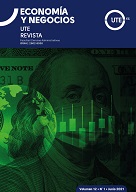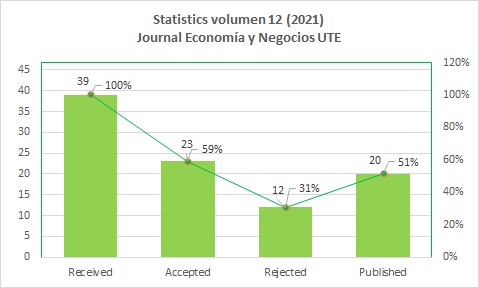Influence of Relational Marketing and Word of Mouth in Traditional Ecuadorian Gastronomy
DOI:
https://doi.org/10.29019/eyn.v13i2.1010Keywords:
Marketing management, Traditional gastronomy, Relational marketing, Word of mouth communication, Culture and food traditionsAbstract
Traditional gastronomy is important in the identity of a pueblo or a nation, it is where marketing is an ally that allows the diffusion of culture and food traditions. The objective of this study is centered on the need to know the direct influence of relational marketing on gastronomy. A bibliographic review was carried out, applying the deductive and descriptive method that allowed the identification of the constructs to be investigated, from which the necessary information that will support this study was gathered. The field investigation determines that relational marketing and word of mouth have an influence on traditional gastronomy, the results evidence the benefit that brings with it the implementation of relational marketing in typical food establishments. With this, it was possible to corroborate the hypotheses raised that dictate that there are certain marketing specialties, as well as strategies that help to promote the recognition of this type of gastronomy. Therefore, it is very important to recognize that within all the variety of marketing specialties, there are specific two that are used so that the traditional food establishments have a clientele that remains loyal and above all that helps to propagate the perceptions. satisfactory or positive about the services through the recommendation of persona in persona.
Downloads
References
Acle-Mena, R.S., Santos-Díaz, J. Y., & Herrera-López, B. (2020). La gastronomía tradicional como atractivo turístico de la ciudad de Puebla, México. Revista de Investigación, Desarrollo e Innovación, 10(2), 237-248. https://doi.org/10.19053/20278306.v10.n2.2020.10624
Acosta, J., & Cornejo, G. (2021). Plan estratégico de marketing para fomentar el turismo gastronómico a través del biohuerto en un restaurante, ciudad de Lima. Horizonte Empresarial, 257-271.
Adler, J. (2013). Why Fire Makes Us Human. Smithsonian magazine, 221-250.
Bahls, Á., Krause, R. W., Camboriú, B., & Añaña, E. d. (2019). Comprensión de los conceptos de culinaria y gastronomía. Una revisión y propuesta conceptual. Estudios y Perspectivas en Turismo, 28(2), 312-330.
Björk, P., & Kauppinen-Räisänen, H. (2014). Culinary-Gastronomic Tourism. A Search for Local Food Experiences. Nutrition & Food Science, 44(4), 294-309. https://doi.org/10.1108/NFS-12-2013-0142
Björk, P., & Kauppinen-Räisänen, H. (2017). A Destination’s Gastronomy as a Means For Holiday Well-Being. British Food Journal, 119(7), 1578-1591. https://doi.org/10.1108/BFJ-09-2016-0394
Burbano-Pérez, Á.B., Velástegui-Carrasco, E.B., Villamarin-Padilla, J.M., & Novillo-Yaguarshungo, C.E. (2018). El marketing relacional y la fidelización del cliente. Polo del Conocimiento, 3(8), 579-90. https://doi.org/10.23857/pc.v3i8.683
Cabrera, S. (2019). Marketing gastronómico.La experiencia de convertir el momento del consumo en un recuerdo memorable. Cuadernos del Centro de Estudios en Diseño y Comunicación, (45), 165-174. https://doi.org/10.18682/cdc.vi45.1842
Camacho Castellanos, J.C. (2008). Marketing de servicios. EUMED. https://bit.ly/3Ev9j64
Campanario, J.M., Moya, A., & Otero, J. (2001). Invocaciones y usos inadecuados de la ciencia en publicidad. Enseñanza de las Ciencias: Revista de Investigación y Experiencias Didácticas, 19(1), 45-56. https://bit.ly/3rGJWqa
Carpio, N.M., Napod, W., & Do, H.W. (2021). Gastronomy as a Factor of Tourist’s Overall Experience: a Study of Jeonju, South Korea. International Hospitality Review, 35(1), 70-89. https://doi.org/10.1108/IHR-08-2020-0031
Castillo-Villar, F.R. (2020). Destination Image Restoration Through Local Gastronomy: The Rise of Baja Med Cuisine in Tijuana. International Journal of Culture, Tourism and Hospitality Research, 14(4), 507-523. https://doi.org/10.1108/IJCTHR-03-2019-0054
Cervera, P., Clapés, J., & Rigolfas. (2001). Alimentación. McGraw-Hill. Interamericana.
Cevallos, S. (2020). El rol del marketing urbano y la gobernanza de los gobiernos locales del Ecuador. Estudios de la Gestión: Revista Internacional de Administración, (8), 145–163. https://doi.org/10.32719/25506641.2020.8.5
Dencker, A.F.M. (2007). Pesquisa em Turismo: planejamento, métodos e técnicas. Revista Hospitalidade, (2), 104-107.
Díaz, L. V. (2007). Gestión del conocimiento y del capital intelectual: una forma de migrar. Revista Escuela de Administración de Negocios, (61), 39-67. https://bit.ly/3rLyF8e
Dossena, C., Mochi, F., Bissola, R., & Imperatori, B. (2021). Restaurants and Social Media: Rethinking Organizational Capabilities and Individual Competencies. Journal of Tourism Futures, 7(1), 20-39. https://doi.org/10.1108/JTF-06-2019-0050
Eroğlu Pektaş, G.Ö. (2019). Relational Marketing Activities in the Scale of Ataköy Marina Istanbul. Journal of International Trade, Logistics and Law, 5(1), 28-34. https://bit.ly/3MrPwGv
Espinoza Espinoza, W.N. (2020). La influencia del marketing en la gastronomía típica de las regiones: Al rescate de nuestro sabores y saberes. E-IDEA Journal of Business Sciences, 2(8), 1-16. https://bit.ly/3SOdVIx
Ferrell, O. C., & Hartline, M. D. (2012). Estratégia de Marketing. (5ta. ed.). Cengage Learnig.
Fusté-Forné, F. (2018). La gastronomía en el marketing gastronómico. Anais Brasileiros de Estudos Turísticos, 7(3), 88-99. https://doi.org/10.34019/2238-2925.2017.v7.3169
Gómez-Bayona, L., Arrubla-Zapata, J.P., Aristizábal Valencia, J., & Restrepo-Rojas, M.J. (2020). Análisis de las estrategias de marketing relacional en instituciones de educación superior de Colombia y España. Retos, Revista de Ciencias de Administración y Economía, 10(20), 343-359. https://doi.org/10.17163/ret.n20.2020.09
Guadarrama Tavira, E., & Rosales Estrada, E. M. (2015). Marketing relacional: valor, satisfacción, lealtad y retención del cliente. Análisis y reflexión teórica. Ciencia y Sociedad, 40(2), 307-340.
Hernández Sampieri, C.R., Fernández Collado, C., & Baptista Lucio, P. (1997). Metodología. McGraw-Hill.
Küster Boluda, I., Vila López, N., & Canales Ronda, P. (2008). El marketing relacional y el marketing emocional. Dos enfoques competitivos para el turismo de sol y playa. Estudios sobre Consumo, 84, 31-40. https://bit.ly/3MkkpN2
Lasater-Wille, A. (2018). The Presentation of Chen in Everday Life: Socializing Chefs in Lima, Peru. RAE-Revista de Administração de Empresas (Journal of Business Management), 58(3), 233-243. https://bit.ly/3rK1bqQ
Levitt, J. A., Meng, F., Zhang, P., & DiPietro, R. B. (2019). Examining Factors Influencing Food Tourist Intentions to Consume Local Cuisine. Tourism and Hospitality Research, 19(3), 337–350. https://doi.org/10.1177/1467358417742687
López-Guzmán, T., & Jesús, M.M. (2011). Turismo, cultura y gastronomía, una aproximación a las rutas. Tourism & Management Studies, 1, 915-922. https://bit.ly/3RQDJ5M
Maulani, T.S., & Presetyo, M.H. (2018). Experiential Marketing, Experiential Value and their Effect on Loyalty of Culture Tourism. Journal of Economic & Management Perspectives, 12(1), 299-306.
Mengual-Recuerda, A., Tur-Viñes, V., Juárez-Varón, D., & Alarcón-Valero, F. (2021). Emotional Impact of Dishes versusWines on Restaurant Diners: From Haute Cuisine Open Innovation. Journal of Open Innovation: Technology, Market, and Complexity, 7(1), 96. https://doi.org/10.3390/joitmc7010096
Morales Vallejo, P. (2012). Tamaño necesario de la muestra:¿Cuántos sujetos necesitamos? Estadística Aplicada a las Ciencias Sociales, 24(1), 22-39. https://bit.ly/3SSzR5m
Morillo Moreno, M. C. (2011). Turismo y producto turístico. Evolución, conceptos, componentes y clasificación. Visión Gerencial, (1), 135-158. https://bit.ly/3CtpxtU
Nasimba, C., & Guanoluisa, J. (2018). Gastronomía tradicional: la cocina de los páramos, la sazón del chagra del cantón Mejía. Congreso de Ciencia y Tecnología ESPE, 13(1). https://doi.org/10.24133/cctespe.v13i1.827
Nicula, V., & Popșa, R. E. (2018). Involvement of Rural Tourism Operators in the Protect ‘Subuit European Gastronómic Region’. Amfiteatru Economic, 20(Special No. 12), 951-966. https://doi.org/10.24818/EA/2018/S12/951
Nyoman Udayana, I. B., Farida, N., Lukitaningsih, A., & Kurnianto Tjahjono, H. (2021). The Important Role of Customer Bonding Capability to Increase Marketing Performance in Small and Medium Enterprises. Cogent Business & Management, 8(1) https://doi.org/10.1080/23311975.2021.1932239
Pintado Blanco, T., & Sánchez Herrera, J. (2010). Estrategias de marketing para grupos sociales. ESIC.
Ponce, C. (2019). Marketing gastronómico: la diferencia entre triunfar y fracasar. Bubok Publishing.
Sánchez, D.J., & Ramo, M. (2011). Evaluación de los hábitos alimenticios y estado nutricional en adolescentes de Sonora, México. Archivos en Medicina Familiar, 10(1), 7-11.
Tenorio-Vilaña, A. F., & Mideros-Mora, A. I. (2022). Teoría de la Preferencia Revelada para Analizar el Comportamiento del Consumidor de Zapatos de Correr. Economía y Negocios, 13(1), 40 - 60. https://doi.org/10.29019/eyn.v13i1.1015
Valcárcel García, D. M., & Venegas Pardo, A. (2015). La comida típica dentro de la internacionalización de la oferta. Turismo y Sociedad, 16, 187-198. http://dx.doi.org/10.18601/01207555.n16.10
Published
How to Cite
Issue
Section
License
Copyright (c) 2022 The Authors

This work is licensed under a Creative Commons Attribution 4.0 International License.
The articles and research published by the UTE University are carried out under the Open Access regime in electronic format. By submitting an article to any of the scientific journals of the UTE University, the author or authors accept these conditions.
The UTE applies the Creative Commons Attribution (CC-BY) license to articles in its scientific journals. Under this open access license, as an author you agree that anyone may reuse your article in whole or in part for any purpose, free of charge, including commercial purposes. Anyone can copy, distribute or reuse the content as long as the author and original source are correctly cited. This facilitates freedom of reuse and also ensures that content can be extracted without barriers for research needs.
Creative Commons Attribution 4.0 International License
The Journal Economía y Negocios is distributed under a
Creative Commons Attribution 4.0 International (CC BY 4.0).

In addition, the journal Economía y Negocios guarantees and declares that authors always retain all copyrights to the original published works without restrictions [© The Author(s)]. Acknowledgment (BY): Any exploitation of the work is allowed, including a commercial purpose, as well as the creation of derivative works, the distribution of which is also allowed without any restriction.















